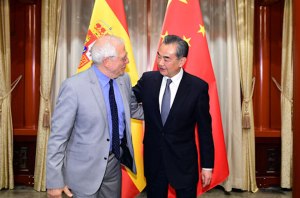French President Emmanuel Macron triggered a series of geopolitical debates after returning from his state visit to China on April 9, 2023.
Strong criticism was provoked by his remarks that Europe should reinforce its strategic autonomy and avoid becoming either a “vassal” of the United States, or a follower which adapts to an “American rhythm and a Chinese overreaction” over Taiwan.
Beijing naturally grasped this opportunity to applaud President Macron’s vision by denouncing the United States as often “coercing others.” President Macron clarified his take on Taiwan three days later, emphasizing support for the status quo in the Taiwan Strait, which he said has been an unchanged “French and European position.”
The caustic reaction to President Macron’s remarks was due to the timing. While his remarks were being made, Chinese military exercises had been launched around Taiwan following Taiwan’s President Tsai Ing-wen’s meeting with US House Speaker Kevin McCarthy in California.
It would seem that President Macron did not follow the advice of the experts he consulted — and quite probably his own foreign ministry — prior to his visit. They had argued that reference needed to be made to the preservation of peace and stability across the Taiwan Strait. It was only days later in remarks by French Foreign Minister Catherine Colonna that the subject was mentioned.
The state visit had two purposes, one diplomatic and the other economic. Macron sought to encourage Chinese President Xi Jinping “to bring Russia back to its senses and everyone back to the negotiating table” over the war in Ukraine.
Xi merely promised that he would contact Ukrainian President Volodymyr Zelensky when “conditions and the timing are right” — carried out on April 26, 2023.

The other purpose of the visit was economic. Accompanied by his Economic and Finance Minister, Bruno Le Maire, and 60 top French executives Macron sought to promote and protect French investment in China at a time when an EU Comprehensive Agreement on Investment with Beijing has become a dead letter.
The shared European mantra in relations with China today is that of “de-risking.” This keyword has been underlined by European Commission President Ursula von der Leyen and echoed by US National Security Advisor Jake Sullivan. Transatlantic differences on China are perhaps more apparent than real.
Macron’s remarks can also be contextualized as the French and European promotion of multilateralism in a multipolar global system. European political leaders do not see China as a threat to a unipolar world, but the “partner–competitor–systemic rival” triptych.
Paris views Washington to be making Taiwan a litmus test on which side a country is found within the great power rivalry between China under Xi’s rule and the United States with bipartisanship on its China strategy. In the US Congress — and in much of the Anglosphere — China hawks have made declared commitments towards Taiwan a test of allegiance.
The emergence of China as another great power is not seen in Europe as an existential threat. Europe is a post-imperial power unlike the United States of the China hawks or Xi’s China. European support for multipolarity and for strategic autonomy within the transatlantic alliance, like “de-risking”, is grounded in a cold-blooded assessment of the nature of European power grounded in an absence of “imperial desire.”
President Macron has the possibility of taking a step back on Taiwan — being the “good cop” — because other leaders of EU institutions and Member States can help take on a more assertive stance. German Foreign Minister Annalena Baerbock, a week after Macron’s visit, confronted her Chinese counterpart Qin Gang with the “horror scenario of a military escalation in the Taiwan Strait.”
The EU’s High Representative of Foreign Affairs and Security Policy and Vice President of the European Commission Josep Borrell also stated the importance of the Taiwan Strait. He synthesized the seemingly different European positions on China in an op-ed published on April 23, 2023.
Aside from expressing the European commitment to its One China policy, he underlined that the situation in and around Taiwan has direct impact on European interests. He further called on EU countries’ naval forces to patrol the Taiwan Strait — in his words, an “absolutely crucial” area — to uphold the principle of freedom of navigation.

Fortunately for Macron and Borrell, in another Chinese own goal, China’s Ambassador to France Lu Shaye, questioned the sovereign status of former Soviet countries. This diplomatic blunder was condemned in Europe and the Chinese Foreign Ministry later disowned Lu’s remarks.
The April meeting of EU foreign ministers broached the need to “reassess and recalibrate our strategy towards China.” The European Council President Charles Michel also announced that the EU’s China policy would be a key topic at the upcoming summit of the 27 heads of states and governments in June — to be preceded by an updated China strategy paper.
The question remains as to the place the Taiwan litmus test is given in a revised EU strategy on China. That is, perhaps, the salutary aspect provoked by Macron’s original remarks.
David Camroux is Honorary Senior Research Fellow and Adjunct Professor at the Centre for International Studies (CERI) Sciences Po. He is also the Co-coordinator of the Franco-German Observatory of the Indo-Pacific.
Earl Wang is doctoral researcher and adjunct lecturer at CERI Sciences Po in Paris. He is also a researcher in the Franco-German Observatory of the Indo-Pacific and is associated with the Institute for Strategic Research (IRSEM).
This article was originally published by East Asia Forum and is republished under a Creative Commons license.

